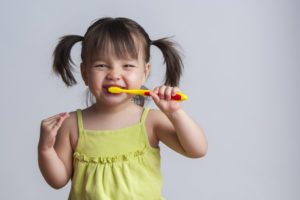 In a year of milestones, first teeth play a big part in an infant’s growth and exploration of the world. Those precious first smiles will go through a lot of changes as your baby grows into an energetic toddler.
In a year of milestones, first teeth play a big part in an infant’s growth and exploration of the world. Those precious first smiles will go through a lot of changes as your baby grows into an energetic toddler.
Teething
The first tooth typically erupts between ages 6 to 12 months and is complete by the age of 3. Gums can be sore and tender causing your child to be irritable. Rubbing sore gums gently with a clean finger, a cold, wet cloth, or a teething ring helps soothe the gums.
Your Infant’s New Teeth
Primary, or “baby” teeth play a crucial role in dental development. Baby teeth allow your child to chew their food and get the proper nutrition they need for healthy growth. Baby teeth also aid in proper speech development and act as a guide for the correct position of the permanent or adult teeth.
Tooth decay can occur when baby teeth first erupt. Begin cleaning your child’s teeth as soon as you see the first tooth growing in. Choose a toothbrush with an appropriate size head and soft bristles. A smear of fluoride toothpaste can be introduced starting at the age of 2. Schedule your child’s first check up when the first tooth erupts or by the age of 1.
Sucking Habits
Sucking is a natural reflex for babies. Often babies will suck on pacifiers, fingers or thumbs. While this is soothing and makes a baby feel safe, it can also change the dental arch and alignment of the teeth. If the sucking habit continues past the age of three, you will want to consult your dentist for ways to discourage the habit.
AAPD Sippy Cup Tips
To help reduce the risk of cavities in children using sippy cups, you can use the following guidelines:
- The sippy cup is a training tool to help children transition from a bottle to a cup. It shouldn’t be used for a long period of time – it’s not a bottle and it’s not a pacifier.
- Unless being used at mealtime, the sippy cup should only be filled with water. Frequent drinking of any other liquid, even if diluted, from a bottle or no-spill training cup should be avoided.
- Sippy cups should not be used at naptime or bedtime unless they only have water in them.


